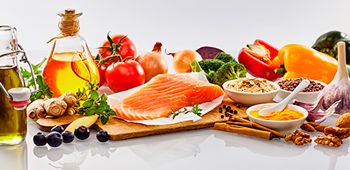
Food is the main source of energy for the body and according to the National Library of Medicine, food is made of various nutrients, and nutrients are the materials the body needs to build itself and stay in top working order. Food is key to human well-being and functional daily behavior, understanding food and the relationship between nutrients and the body is key in order to live a balanced and healthy life. In this article, we will discuss how certain foods can help the mental health condition of depression.
“Depression is more than just feeling down or having a bad day. When a sad mood lasts for a long time and interferes with normal, everyday functioning, you may be depressed.”[1]
When we eat, we also fuel our body with energy, and every food choice we make impacts our way of living. Nowadays we have plenty of fast food options and this might include healthy or unhealthy options.
Research from the past ten or so years has shown that the more ultra-processed foods a person eats, the higher the chances that they feel depressed and anxious[2]. This leads specialists and patients to pay more attention to today’s people’s diets, of course, there are certain foods to avoid and “certain must-eat foods”
PubMed Central publishes scientific studies that have explored the relationship between diet and depression, suggesting that certain foods may have a positive impact on mood, while others may contribute to depressive symptoms. It is important to note that while diet can play a role in mental health, it should not be considered a substitute for professional treatment.
“There is no specific diet to treat depression, but eating more of some foods and less or none of others can help some people manage their symptoms.”[3] Although this is not a prescription, some of the foods in the list we will review may help reduce depression symptoms, however, we encourage you to make a proper diagnosis with your healthcare provider or personal doctor since professional treatment is always the right path to follow, although here we include informational topics about food and its relation with depression.
Best Foods for Depression
- Omega-3 fatty acids: Studies[4] have shown that omega-3 fatty acids, found in fatty fish (such as salmon, sardines, and mackerel), walnuts, flaxseeds, and chia seeds, may have antidepressant effects. They are related to the brain´s health support and reduce inflammation. There are plenty of dishes you can cook with Omega-3 fatty acids, but laboratories and pharmaceutics now sell this nutrient as supplements.
- Antioxidant-rich foods: Fruits and vegetables high in antioxidants, such as berries, citrus fruits, kale, spinach, and bell peppers, contain compounds that may protect against oxidative stress, which is linked to depression. Vitamins A, C, and E are an example of antioxidants; also, selenium[5] plays a big role in reducing anxiety and depression.
- Whole grains: Whole grains like quinoa, brown rice, and whole wheat bread are complex carbohydrates that release energy slowly, providing a steady supply of glucose to the brain. This can help stabilize mood and prevent fluctuations in blood sugar levels. Cereal grains are the most essential food staples. They are eaten almost daily by large populations. They supply a significant percentage of the calories consumed by the world’s population. Cereal grains and the products made from them provide food not only for people, but also for livestock, such as cattle, chickens, and hogs[6].
The last foods in this list include probiotics and foods rich in B Vitamins. Fermented foods like yogurt, kefir, kombucha, and kimchi contain beneficial bacteria that may influence mood and brain function. Foods rich in B Vitamins: B vitamins, particularly folate (B9) and vitamin B12, are important for brain health as well. Leafy greens, legumes, eggs, and lean meats are good sources of these vitamins.
Now that we have reviewed some of the foods to eat while having depression, you might think about which foods you should avoid. Diet and depression are so linked these days, and many researchers have focused on this topic, proving us with clear information about what food can be beneficial for our brain and body and which one will not. According to Harvard Health Publishing[7], diet is such an important component of mental health that it has inspired an entire field of medicine called nutritional psychiatry.
Patients with depression are now seeking nutritional support as well as psychological or psychiatric help. In some cases, they might change their diet to make the right food choices and avoid certain ingredients, but these lead us to question what is the right diet and which is not? As far as we have researched, there is no right or wrong diet, but there are indeed some foods to avoid for depression.
Foods to Avoid for Depression
- Processed foods: Highly processed foods, such as fast food, sugary snacks, and processed meats, have been associated with an increased risk of depression. These foods are often high in unhealthy fats, sugar, and additives while lacking essential nutrients. The nutritional fundamentals accepted by the World Health Organization and most nutritional authorities today include vegetables, beans, nuts, seeds, and fruit as healthy foods; and salt, saturated fat, and excess sugar as disease-causing. Excessive amounts of animal products may lead to premature aging, increased risk of chronic disease and higher all-cause mortality. Multiple studies have been published on hundreds of thousands of people, followed for decades showing that the objective endpoint of death is increased with higher amounts of animal product consumption. Furthermore, refined carbohydrates may not just lead to being overweight and diabetic but also contribute to dementia, mental illness, and cancer[8].
- Sugar and refined carbohydrates: Consuming excessive amounts of sugar and refined carbohydrates (e.g., white bread, pastries, sodas) can lead to blood sugar spikes and crashes, negatively affecting mood and energy levels.
- Trans fats: Trans fats, commonly found in fried and commercially baked goods, have been linked to an increased risk of depression and inflammation in the body. Checking food labels for “partially hydrogenated oils” can help identify trans fats.
- Alcohol: While moderate alcohol consumption may not significantly impact everyone’s mental health, excessive or chronic alcohol use can worsen depression symptoms and interfere with the effectiveness of treatment.
- Caffeine: High caffeine intake, particularly in sensitive individuals, can disrupt sleep patterns and contribute to anxiety or agitation, which may exacerbate symptoms of depression[9].
It’s important to remember that individual responses to specific foods may vary, and maintaining a balanced diet overall is crucial for overall well-being. Also, seeking professional health is highly recommended as we mentioned before, seeing a doctor for both food-related issues and depression is important because these conditions can have a significant impact on a person’s overall well-being.
A study of diet and depression of Harvard Health Publishing has shown that one could argue that, well, being depressed makes us more likely to eat unhealthy foods. So we should ask what came first, the diet or the depression? Researchers have addressed this question, thankfully. Another large analysis looked only at prospective studies, meaning they looked at baseline diet and then calculated the risk of study volunteers going on to develop depression. Researchers found that a healthy diet (the Mediterranean diet as an example) was associated with a significantly lower risk of developing depressive symptoms[10].
However, professional diagnoses provide an accurate treatment since they can determine whether you have food-related issues or depression. Similarly, they can assess the severity and nature of your depressive symptoms, so if you are struggling with depression and eating disorders, it is advisable to consult a professional for a comprehensive test and appropriate treatment.
How Are Food and Depression Related After All?
While no specific food or diet can cure depression, evidence suggests that certain dietary patterns and nutrient-rich foods may have a positive impact on mood and overall mental well-being. Depression as far as we know, is intricately connected, since poor dietary practices are linked to depression symptoms[11].
While diet alone cannot cause or cure depression, there are several ways in which food can impact mood and overall mental well-being. A poor diet lacking essential nutrients can contribute to imbalances in brain chemistry, affecting mood regulation.
For example, deficiencies in B vitamins, omega-3 fatty acids, and certain minerals like zinc and magnesium have been associated with an increased risk of depression, as we mentioned. Another example is the neurotransmitters, such as serotonin and dopamine, which play a crucial role in regulating mood. The production and function of these neurotransmitters can be influenced by the availability of specific nutrients obtained through diet, such as tryptophan (a precursor to serotonin) and tyrosine (a precursor to dopamine).
Certain dietary patterns, particularly those rich in fruits, vegetables, and whole grains, provide antioxidants and anti-inflammatory compounds that help combat inflammation and oxidative stress (chronic inflammation and oxidative stress in the body have been linked to depression)[12].
Food and Emotions
Emotional eating and cravings are also related to depression and can sometimes lead to changes in appetite and eating behaviors. Some individuals may turn to comfort foods, which are often high in sugar, fat, and calories, as a way to cope with negative emotions. While these foods may provide temporary pleasure, they can worsen mood and contribute to a cycle of emotional eating.
According to one study, the relationship between eating and emotion has always interested researchers of human behavior. This relationship varies according to the particular characteristics of the individual and according to the specific emotional state[13].
As we see, numerous studies have highlighted the potential impact of a healthy diet on mental well-being. Foods like fruits, vegetables, whole grains, lean proteins, and omega-3 fatty acids have been associated with a lower risk of depression, while diets high in processed foods, sugary snacks, and unhealthy fats have been linked to an increased risk. Furthermore, certain nutrients such as omega-3 fatty acids, B vitamins, vitamin D, and magnesium have shown promising effects in managing depressive symptoms.
In conclusion, the relationship between food and depression is complex and multifaceted. While it is evident that certain dietary patterns and nutrient deficiencies can contribute to the development and exacerbation of depression, it is important to recognize that food alone cannot be considered a cure for this mental health condition. Depression is a complex disorder with various underlying factors, including biological, psychological, and environmental components[14]. However, it is important to approach the relationship between depression and food with caution.
Contact Us to Learn More
If you are struggling with depression and interested in following a diet to reduce depression symptoms, schedule an appointment with one of our doctors. We can help determine the right treatment for you. Contact us online anytime or call us at (619) 373-0229.
References
[1, 14] “mental health Conditions: depression and anxiety”. https://www.cdc.gov/tobacco/campaign/tips/diseases/depression-anxiety.html (Accessed June 21, 2023).
[2] “The Link Between Highly Processed Foods and Brain Health”. https://www.nytimes.com/2023/05/04/well/eat/ultraprocessed-food-mental-health.html (Accessed June 21, 2023).
[3, 4, 9] “What foods are good for helping depression?”. https://www.medicalnewstoday.com/articles/318428#_noHeaderPrefixedContent (Accessed June 21, 2023).
[5] “Selenium: What it does and how much you need”. https://www.medicalnewstoday.com/articles/287842 (Accessed June 21, 2023).
[6] “Food”. https://education.nationalgeographic.org/resource/food/ (Accessed June 21, 2023).
[7, 10, 12] “Diet and depression”. https://www.health.harvard.edu/blog/diet-and-depression-2018022213309 (Accessed June 21, 2023).
[8] Fuhrman J. The Hidden Dangers of Fast and Processed Food. Am J Lifestyle Med. 2018 Apr 3;12(5):375-381. doi: 10.1177/1559827618766483. PMID: 30283262; PMCID: PMC6146358.
[11] Selvaraj R, Selvamani TY, Zahra A, Malla J, Dhanoa RK, Venugopal S, Shoukrie SI, Hamouda RK, Hamid P. Association Between Dietary Habits and Depression: A Systematic Review. Cureus. 2022 Dec 9;14(12):e32359. doi: 10.7759/cureus.32359. PMID: 36632273; PMCID: PMC9828042.
[13] Canetti L, Bachar E, Berry EM. Food and emotion. Behav Processes. 2002 Nov;60(2):157-164. doi: 10.1016/s0376-6357(02)00082-7. PMID: 12426067.


